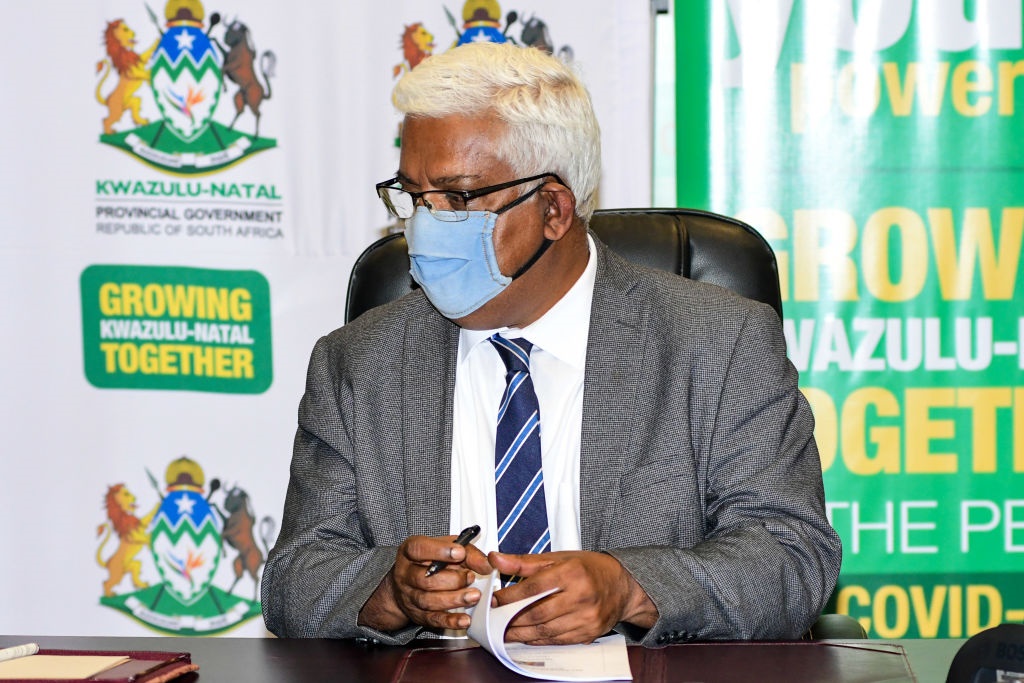


Ravi Pillay, KZN Finance MEC.
Darren Stewart/Gallo Images via Getty Images
- The bulk of KZN’s R6.2-billion response to Covid-19 will go to the health department.
- The public health sector has been allocated R4.5-billion, the majority of the budget.
- The education sector also scoops up a chunk of the budget at R1 billion.
The bulk of the KwaZulu-Natal government Covid-19 special adjustment budget will go to the health department, while education, transport and social development takes the rest of the R6.2 billion allocation, Finance MEC Ravi Pillay said on Thursday.
The budget reprioritisation is part of the R500 billion Covid-19 relief package, Pillay said.
“In this regard, national departments are contributing R100 billion towards the relief package, while provinces are contributing R30 billion. KwaZulu-Natal’s share of the R30 billion was calculated by applying the equitable share formula, and the province was therefore required to reprioritise R6.210 billion from various departments toward the Covid-19 response.”
READ | Cabinet causing ‘anxiety’ as it dithers to keep schools open or not, unions say
He said health costs were the obvious central priority with an estimated R8.2 billion required for the department’s response to Covid-19.
This would take into account the provision of personal protective equipment (PPE), purchasing ventilators, providing for additional staff and ICU beds, and the provision of additional infrastructure.
“The infrastructure provided includes converting existing wards into Covid-19 wards, as well as quarantine and isolation sites across the province. This cost also provides for temporary field hospitals in areas such as Durban, Pietermaritzburg, KwaDukuza and Empangeni,” he said.
ALSO READ | Severe budget cuts for agriculture department to bankroll Covid-19 fight
Pillay said a large portion of the cost related to additional staff (ICU staff, doctors, nurses and tracing teams) at a cost of R3.2 billion, while the infrastructure required for the Covid-19 response amounts to R1.7 billion, with the balance made up of equipment, linen, ICU beds, among others.
“The department has included reprioritisation of at least R1.4 billion from within their budget, and an additional conditional grant allocation of R585.7 million is made… The amount allocated to health from the provincial reprioritisation sees R4.5 billion of the R6.2 billion allocated to this department. The balance of the costs will be funded through further internal reprioritisation.”
Vandalised schools
Pillay said the costs in education amount to R2.8 billion and take into account the repairing of schools vandalised during lockdown; the provision of chemical toilets at schools that do not have adequate toilet facilities; the provision of water to schools; PPE and additional cleaners.
“The amount identified through internal reprioritisation is R1.2 billion and the amount to be allocated to the department from the R6.2 billion provincial reprioritisation is R1 billion. The balance of the costs will be funded through further internal reprioritisation.”
Social development would have to provide care to the homeless and had to also give out food parcels to destitute families. This cost was calculated at R25.7 million and R239.1 million, respectively, Pillay said.
The department also indicated that funds of R35.3 million were needed to address gender-based violence, he added.
“Thus the Department of Social Development’s response is costed at R300 million. Provincial Treasury engaged the department and were able to identify this full amount from internal reprioritisation as a result of the slow filling of posts in the first quarter, as well as lower transfers to Early Childhood Development (ECD) centres, partially as these were over-budgeted for, when compared to historic spending, but also because the ECD centres were not open during lockdown.”
READ | City of Joburg finally tables ‘better budget for residents’
Pillay said pupil transport was also a priority as part of the transport department budget for its Covid-19 response.
He said the department calculated a shortfall in transporting 58 908 pupils, but taking into account social distancing conditions.
Pillay said the calculations take into account that no transport was provided under the initial stages of lockdown when all schools were closed, and also take into account the phased return to school of the various grades.
“This shortfall was calculated at R214 million and the full shortfall is provided for from the provincial reprioritisation of R6.2 billion. As mentioned, besides this additional allocation for learner transport, it was also decided to allocate R200 million to transport for emergency projects to improve the road network and to rehabilitate roads leading to health facilities, and re-establishment costs where projects were affected by the national lockdown.”

